You are viewing the Cultures of Knowledge Blog archive for the ‘Events’ Category:
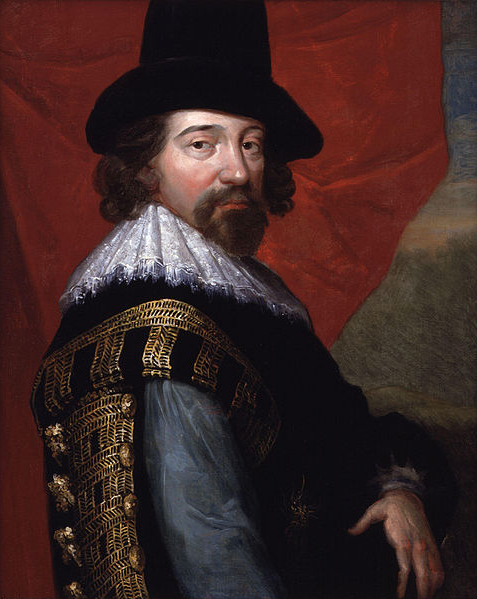
Portrait of Francis Bacon, Viscount St Alban, by John Vanderbank (after an unknown artist). 1713? (c.1618). Oil on canvas, 76.5 by 63.2cm. (National Portrait Gallery, London, NPG520; image taken from Wikimedia Commons).
In the third installment of the Project’s seminar series on Thursday 13 May, Professor Alan Stewart (Columbia University and the Centre for Editing Lives and Letters, QMUL) gave a fascinating and wide-ranging talk on ‘Writing Francis Bacon’s Letters’. Taking as his starting point the curious anomaly that, despite his standing as a public intellectual, Bacon’s own extant letters (c.800) do not address scholarly themes and were not exchanged with continental luminaries such as Galileo, Grotius, and Peiresc (instead focusing on a ‘worldly and slightly sordid narrative’ of social and political affairs), Stewart argued that for an epistolary elaboration of Bacon’s intellectual agenda we need to focus on the letters he crafted as a lawyer and junior parliamentarian on behalf of Robert Devereux (the 2nd Earl of Essex) during the 1590s. Within an environment of manuscript production in which letters were not a private ‘conversation between two absent persons’ (in the Erasmian formulation) but were instead drafted, disseminated, and consumed collaboratively, and a political one in which Essex relied on a large team of quasi-scholarly secretaries and advisers to generate key documentation, Bacon was able to use the letters to advance anonymously themes which prefigure his later The Advancement of Learning (1605). This tactic is particularly evident in a letter ostensibly from Essex to Fulke Greville on research methods (which include Baconian attacks on the usefulness of epitomes and veneration of the value of history), and three letters to Roger Manners, the 5th Earl of Rutland (which include a Baconian discourse on the pursuit of knowledge as the purpose of travel). However, concluded Stewart, scrutiny of these practices during the 1601 trial following Essex’s failed rebellion led Bacon to distrust epistolary formats, meaning that thereafter we must look beyond letters to recontruct his intellectual project. Seminars take place in the Faculty of History on George Street on Thursdays at 3pm. For future seminars in the series, please see here.
 Podcast now available on the seminar page!
Podcast now available on the seminar page!
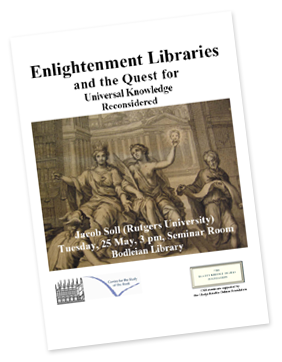 A lecture by Jacob Soll on ‘Enlightenment Libraries and the Quest for Universal Knowledge Reconsidered’ will take place at 3pm on Tuesday 25 May in the Seminar Room of the New Bodleian Library. Soll gained his doctorate in history at Cambridge University after completing a diploma of advanced studies at the École des Hautes Études en Sciences Sociales in Paris. His 2005 book, Publishing The Prince, about the afterlife and translations of Machiavelli’s work, won the Jacques Barzun Prize in Cultural History. Since then he has written about the birth of information culture in Europe, including research on the origins of state archives, on note-taking by early modern readers, on accountancy in seventeenth-century Holland, and the critical uses of historical evidence in early modern Europe. In 2009 he published The Information Master: Jean-Baptiste Colbert’s Secret State Intelligence System. Soll teaches at Rutgers University, New Jersey. He is a Consulting Editor of the Journal of the History of Ideas and a co-founder and Associate Editor of the new online journal Republics of Letters, founded at Stanford University with Dan Edelstein.
A lecture by Jacob Soll on ‘Enlightenment Libraries and the Quest for Universal Knowledge Reconsidered’ will take place at 3pm on Tuesday 25 May in the Seminar Room of the New Bodleian Library. Soll gained his doctorate in history at Cambridge University after completing a diploma of advanced studies at the École des Hautes Études en Sciences Sociales in Paris. His 2005 book, Publishing The Prince, about the afterlife and translations of Machiavelli’s work, won the Jacques Barzun Prize in Cultural History. Since then he has written about the birth of information culture in Europe, including research on the origins of state archives, on note-taking by early modern readers, on accountancy in seventeenth-century Holland, and the critical uses of historical evidence in early modern Europe. In 2009 he published The Information Master: Jean-Baptiste Colbert’s Secret State Intelligence System. Soll teaches at Rutgers University, New Jersey. He is a Consulting Editor of the Journal of the History of Ideas and a co-founder and Associate Editor of the new online journal Republics of Letters, founded at Stanford University with Dan Edelstein.
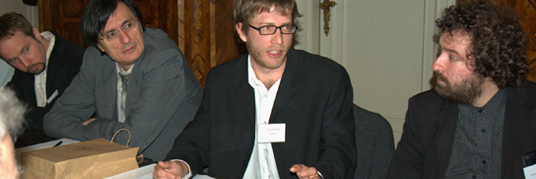
Workshop participants in discussion. © SOM
The third and final workshop in our extremely successful east-central European series took place last month in Budapest on the theme of ‘Encyclopaedism, Pansophia, and Universal Communication, 1560-1670′. The workshop was generously hosted and co-sponsored by Central European University and the Semmelweis Museum, Library, and Archives of the History of Medicine (with additional financial support from the Institute of Literary Scholarship of the Hungarian Academy of Sciences and the Institute for Literary Studies and Lingusitics of the University of Miskolc), and was organised by Márton Szentpéteri, Gábor Kecskeméti, Benedek Varga, and Márton Zászkaliczky. It allowed eighteen emerging and established scholars to converge on the related seventeenth-century ideas of collecting all knowledge into a single coherent system and of teaching all things to all men, as well as the networks and communicative strategies by which these universalist philosophies were disseminated across the fragmented geographical and political canvas of east-central Europe. For full details of the workshop, including abstracts and photographs, please see the workshop webpage. Themes addressed in the course of the workshop series will be drawn together in the international conference Universal Reformation: Intellectual Networks in Central and Western Europe, 1560-1670 (St Anne’s College, University of Oxford, 21-23 September).
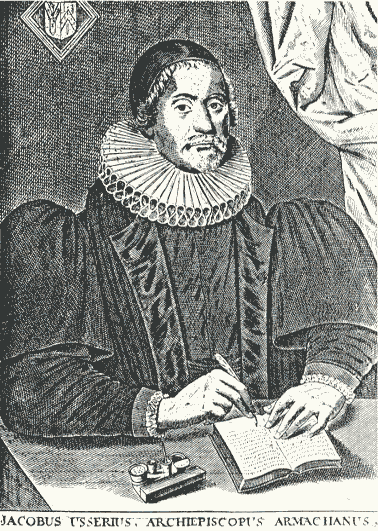
James Ussher, Archbishop of Armagh and Primate of All Ireland (1581-1656). Wikimedia Commons.
In the second installment of the Project’s seminar series on Thursday 6 May, Dr Elizabethanne Boran (The Edward Worth Library, Dublin, and formerly The Ussher Project) provided another capacity audience with a detailed paper entitled ‘“Live and speak unto the Church, when you are dead”: The Correspondence of James Ussher (1581-1656) and Samuel Ward (1572-1643)’. Focusing on the letters exchanged between the Irish primate and the Master of Sidney Sussex College Cambridge from 1625 – a corpus of around 45 extant documents – Boran used the correspondence to shed fascinating light on the religious preoccupations and perspectives of the two scholars (the letters frequently cover church history, doctrinal controversies, religious radicals, and Arminianism), as well as their unequal personal dynamics (Ussher, the younger but more senior of the two, frequently adopts a superior tone). The paper also used the Ussher/Ward case study as the basis for many suggestive insights into the structure and functioning of correspondence networks more generally, in particular regarding the ‘temporal flow’ of the seventeenth-century Republic of Letters (the rhythm of which was heavily influenced by the seasons and the weather), the complex relationship between the content of correspondence and the itineraries of the senders and receivers as well as their opportunities for verbal forms of contact (letters sent during 1626, when both men were in close physical proximity, are generally ‘staccato’), and the extent to which epistolary networks were mapped onto and relied upon adjacent professional, social, and economic modes of exchange (in particular mercantile and friendship networks, and practices of academic visiting). Seminars take place in the Faculty of History on George Street on Thursdays at 3pm. For future seminars in the series, please see here.
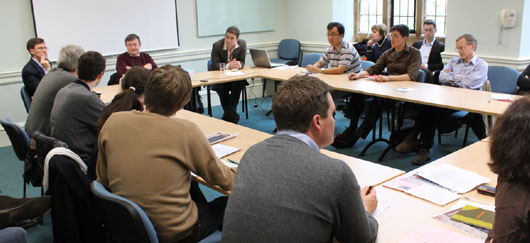
Dr Noël Golvers answers questions following his talk.
In the opening paper of the Project’s seminar series on Thursday 29 April, Dr Noël Golvers (Catholic University of Leuven) provided a large audience with a fascinating overview of the contours, chronology, and thematic preoccupations of ‘Scholarly Correspondence from the Jesuits in China with Europe (17th–18th Centuries)’. In a wide-ranging analysis, Golvers argued for the strategic importance of a large, well-regulated correspondence network to this administratively complex and geographically distributed community, a network which frequently and increasingly sustained communication on scientific matters alongside confessional and organizational subjects (previously used by Golvers to shed light on Jesuit contributions to astronomy and mathematics). He provided an overview of the characteristics of the correspondence generated by the China mission, information on transfer routes (both overseas and overland), and a synopsis of the broad range of learned topics they covered, especially from the 1680s (including mathematics, astronomy, engineering, and cartography). He also considered the impact of the letters on contemporary European readers, as well as their descent to and organisation within modern archives and collections. Overall, the paper provided fresh insights into both a particular epistolary culture of knowledge, and a neglected source for seventeenth-century European and world history more generally. Seminars take place in the Faculty of History on George Street on Thursdays at 3pm. For future seminars in the series, please see here.
 Podcast now available on the seminar page!
Podcast now available on the seminar page!
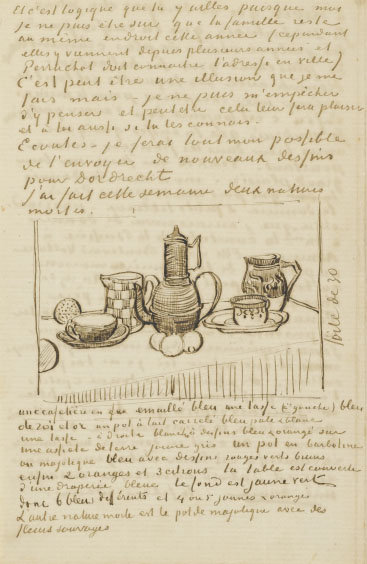
Detail of a letter from van Gogh to his brother. Arles, on or about 20 May 1888. (Van Gogh Museum, Amsterdam, b529 a-c V/1962).
A lecture on ‘The Letters of Vincent van Gogh: Book and Web Edition’ will take place at the Maison Française, Oxford on Wednesday 28 April at 4.30pm. Part of the Digital Humanities Seminar 2010, the event will showcase ‘Vincent van Gogh: The Letters’, which launched simultaneously as a six-volume book edition and scholarly web edition in October 2009 after fifteen years of research by the van Gogh Museum and the Huygens Institute. Two of the creators of the resource, Nienke Bakker (van Gogh Museum, Amserdam) and Peter Boot (Huygens Institute, The Hague), will discuss the genesis of the project, the depth and variety of the research, the importance of the letters both as an art historical source and as literature, and the rationale for publishing both a voluminous book edition and a free web edition. For further information, please see the lecture flyer. For the project website, please see www.vangoghletters.org.

Podcast now available on the seminar page!







 Join
Join 